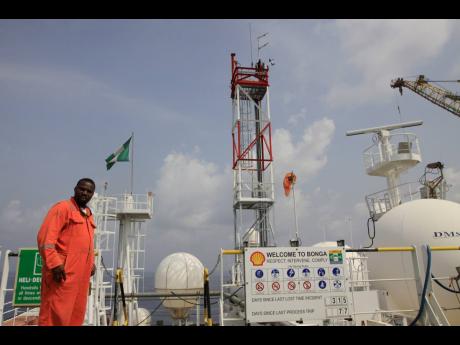Activists urge Nigeria to delay Shell’s US$2.4 billion sale of assets in deeply polluted Niger Delta
Local activists and international environmental groups want Nigeria’s government to delay approving the sale of oil company Shell’s onshore assets, claiming that Shell is trying to shirk its environmental and social responsibilities in the highly polluted Niger Delta.
The London-based company is trying to sell its subsidiary Shell Petroleum Development Company — which operates its onshore assets in the delta — to Renaissance Africa Energy Company, a consortium of local companies. Shell says the US$2.4 billion divestment deal is part of a “wider reconfiguration of the Nigerian oil and gas sector”.
But the Centre for Research on Multinational Corporations, SOMO, a Dutch nonprofit, released a report Wednesday saying that Shell shouldn’t be allowed to divest in the delta unless it takes “responsibility for its toxic legacy of pollution and ensures the safe decommissioning of abandoned oil infrastructure”.
Protesters have appealed to the government of Nigeria, Africa’s top oil producer, to halt the sale until environmental concerns are addressed. Lezina Mgbar, a 54-year-old healthcare worker and farmer who participated in a weekend demonstration in the country’s oil capital of Port Harcourt, said her Korokoro Tai community in Ogoniland has been “severely” affected by oil spills.
“In the morning, children and women have to travel far to get water, so children often cannot get to school on time, and our farm yields are poor,” Mgbar told The Associated Press. “We demand that Shell restore our land and clean our water before any divestment.”
Scientific studies have found high levels of chemical compounds from crude oil, as well as heavy metals, in the delta, where the industry largely drives Nigeria’s economy but can leave communities’ water sources slick with contaminants.
Activists say that Shell has a history of poor divestment in the region. They point to a wellhead blowout in the Santa Barbara River, which flows through the Niger Delta, in 2021. The wellhead wasn’t producing but wasn’t decommissioned by Shell or its new owners, Aiteo Eastern E & P. The facility spewed crude oil and associated gas for 38 days and caused planet-warming methane to be released into the atmosphere, killed fish, and devastated riverside farms.
Richard Steiner, an environmental consultant with a history of work in the Niger Delta, said the blowout on the Santa Barbara River highlights the risk of Shell and other oil majors transferring assets to new local firms without resolving legacy, environmental and social concerns first.
“Many of the purchasing companies do not have the technical or financial capacity to manage these oil and gas operations safely,” he said.
aNigerian President Bola Tinubu, who holds the portfolio of petroleum minister, will ultimately decide the fate of the Shell-Renaissance transaction. His spokesperson did not comment when contacted on Monday.
SOMO’s report documents other cases of environmental pollution that were allegedly not addressed by Shell before past divestments. Two communities, Ogale and Bille in Rivers State, have been in court pushing to make the company address past environmental concerns.
Shell and other oil companies often blame third-party interference, namely militant attacks and vandalism by oil thieves, for spills. However, companies still must clean up regardless of the cause, according to Nigeria’s law.
The deal with Renaissance is the latest move by Shell to limit its onshore operations in Nigeria while focusing on deepwater operations. Other companies, including Chevron, ExxonMobil and TotalEnergies, have been taking similar steps but without the scale of protests Shell, which is the most dominant in the region, has faced.
The civil society coalition that helped organise protests aimed at delaying the sale have petitioned Tinubu to adopt a set of principles to ensure more responsible petroleum industry divestments.
That “would help ensure a transparent process that would assess the capacity of the incoming companies, with meaningful community consultation throughout, address environmental pollution and deteriorating and abandoned infrastructure,” said Florence Kayemba, director of the Niger Delta-focused Stakeholder Democracy Network, one of the groups that came up with the principles.
Unlike in previous sales, Shell is transferring all its subsidiary shares to Renaissance, resulting in a change of ownership that would see SPDC continue to carry liabilities. Shell has said SPDC, with new ownership, will continue with the current staff and be responsible for remediation where spills have occurred in the past.
SOMO’s report noted the arrangement but said the energy giant is still trying to avoid its responsibility.
Audrey Gaughran, SOMO’s director, told the AP in a statement that “ensuring that the historical pollution, the lack of funding for safe decommissioning and poor financial transparency are fully addressed in Nigeria will be an important litmus test for a just energy transition across the world”.
AP

